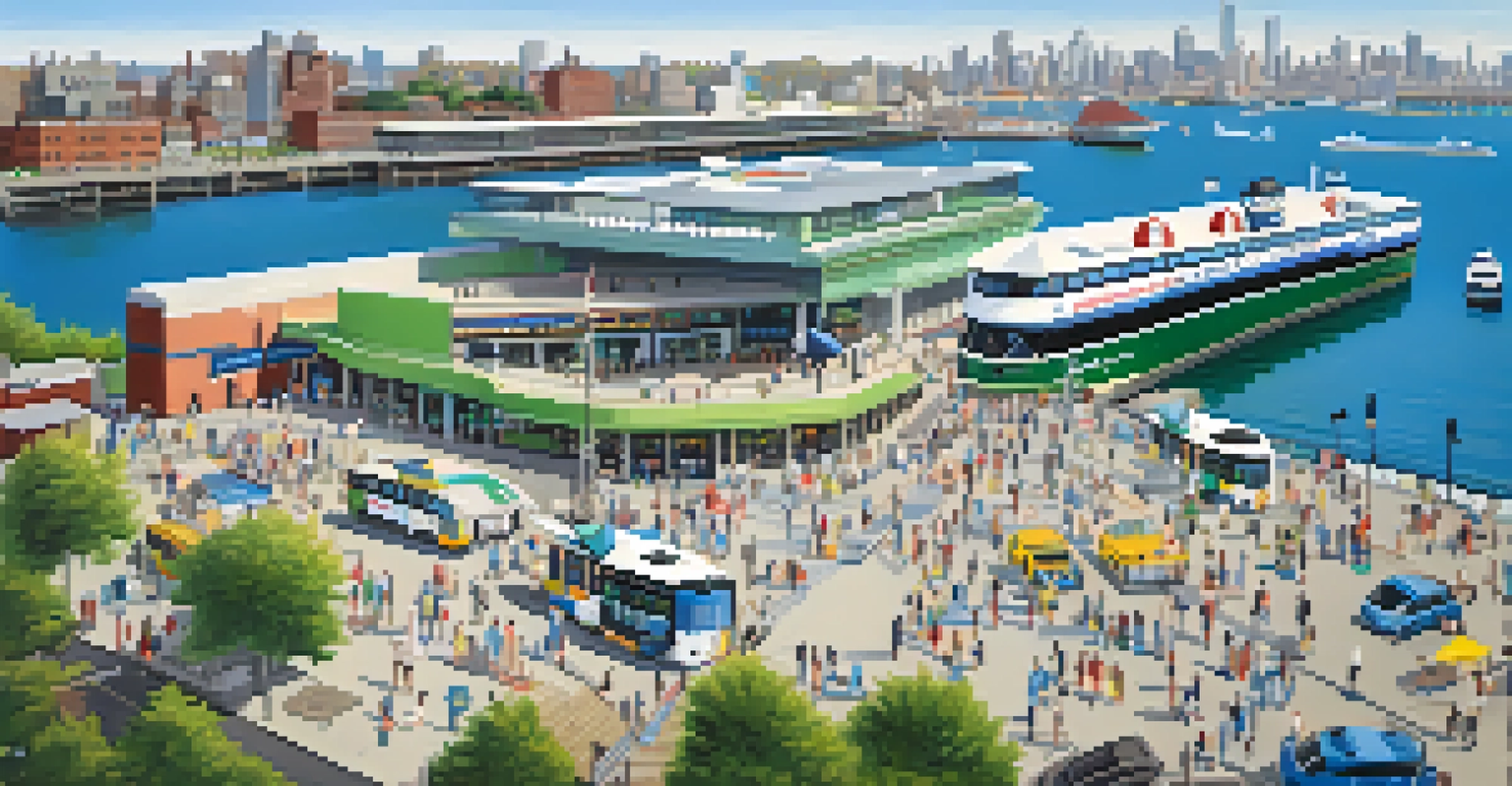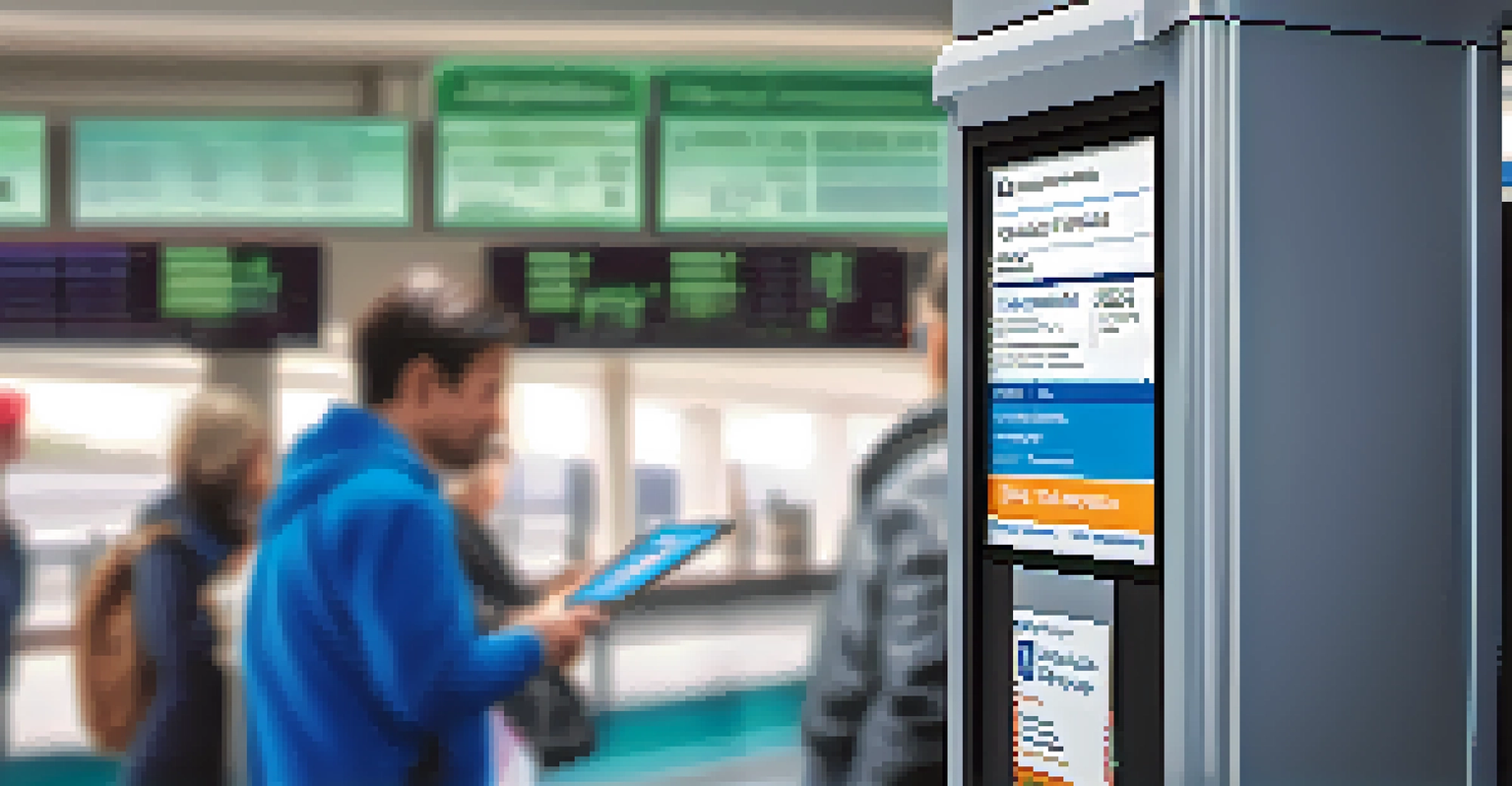The Role of Ferries in Jersey City's Transportation Network

Introduction to Jersey City's Transportation Landscape
Jersey City boasts a diverse transportation network that caters to a vibrant community. With its proximity to New York City, the demand for efficient transit options is crucial. Ferries play a significant role in easing commutes and connecting residents to various destinations.
Public transportation is the lifeblood of cities, connecting people to opportunities and each other.
The blend of buses, light rail, and ferries creates a dynamic system that addresses the needs of commuters. Ferries offer a unique travel experience, providing scenic views and a refreshing alternative to traditional land travel. Understanding the significance of ferries helps us appreciate their impact on daily life in Jersey City.
As we delve deeper into the specifics of ferry services, we’ll uncover how they fit into the broader transportation framework and enhance accessibility for everyone.
Ferry Routes: Connecting Jersey City to Key Destinations
Ferries in Jersey City provide critical links to Manhattan, Hoboken, and beyond. Major routes like the NY Waterway connect passengers to bustling areas with ease, ensuring a swift commute. These routes not only serve daily commuters but also attract tourists exploring the city.

By offering direct access to major hubs, ferries reduce travel time and alleviate congestion on land. For instance, a ferry ride from Jersey City to lower Manhattan can take as little as 10-15 minutes. This efficiency is a game-changer for anyone looking to maximize their time in the city.
Ferries Enhance Commuter Experience
Ferries provide a swift and scenic alternative for commuters, connecting Jersey City to key destinations like Manhattan and Hoboken.
The thoughtful design of these routes highlights the importance of planning in public transportation, showing how ferries can complement other modes of transit.
The Environmental Benefits of Ferry Transportation
Ferry services present a more eco-friendly alternative to road travel. By transporting numerous passengers at once, ferries help reduce the number of cars on the road, thereby lowering greenhouse gas emissions. This is particularly important in densely populated areas like Jersey City.
Sustainable transportation is not just about reducing emissions; it's about creating livable, vibrant communities.
Additionally, many ferry operators are investing in cleaner technologies, such as hybrid engines, to further minimize their environmental impact. The move towards sustainable practices reflects a growing awareness of the need for greener transportation options.
As residents and visitors prioritize eco-conscious choices, the popularity of ferries is likely to increase, aligning with broader environmental goals in the community.
Challenges Facing Ferry Services in Jersey City
Despite their advantages, ferry services in Jersey City face several challenges. Weather conditions can significantly impact ferry schedules, leading to delays and cancellations. This unpredictability can frustrate commuters who rely on ferries as a primary mode of transportation.
Moreover, the limited number of ferry operators can create capacity issues during peak hours, resulting in overcrowding. Addressing these challenges requires careful planning and investment in infrastructure to ensure that the ferry system remains reliable.
Environmental Benefits of Ferries
Ferries reduce greenhouse gas emissions by transporting multiple passengers at once, supporting eco-friendly transportation in Jersey City.
By recognizing and tackling these obstacles, Jersey City can enhance the overall ferry experience for commuters and tourists alike.
The Economic Impact of Ferries on Jersey City
Ferries contribute significantly to Jersey City's economy by facilitating tourism and supporting local businesses. Easy access to the waterfront attracts visitors who spend money at restaurants, shops, and attractions. This influx of visitors can boost the local economy and create job opportunities.
Additionally, a robust ferry system can enhance property values in the vicinity of ferry terminals. Many residents are willing to pay a premium for easy access to ferry services, highlighting the demand for convenient transportation options.
As we recognize the economic ripple effect of ferries, it's clear they play a vital role in Jersey City's ongoing growth and development.
Future Developments in Jersey City's Ferry Services
Looking ahead, there are exciting developments in store for Jersey City's ferry services. Plans for expanding routes and increasing frequency aim to meet the growing demand for efficient transit options. These enhancements will help cater to both residents and visitors as the city continues to evolve.
Investments in modernizing ferry terminals and incorporating digital ticketing systems will also improve the overall user experience. Such innovations can streamline operations and make travel more convenient for everyone.
Community Engagement is Vital
Involving the community in decisions about ferry services leads to better routes and schedules, ultimately enhancing the ferry experience for all.
With these advancements on the horizon, the future of ferry transportation in Jersey City looks bright, promising to further integrate into the city's transportation network.
The Community's Role in Shaping Ferry Services
Community feedback is essential in shaping the future of ferry services. Engaging with residents can help transit authorities understand their needs and preferences, leading to better service delivery. Local input can guide decisions on routes, schedules, and amenities that enhance the ferry experience.
Moreover, community events and awareness campaigns can promote ferry usage, encouraging more people to explore this transportation option. As more residents recognize the benefits of ferries, the demand for services will likely grow, prompting further improvements.

Ultimately, a strong partnership between ferry operators and the community can create a transportation network that benefits everyone.